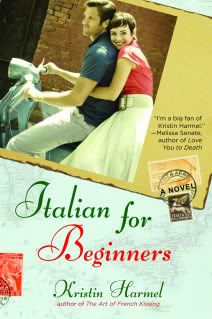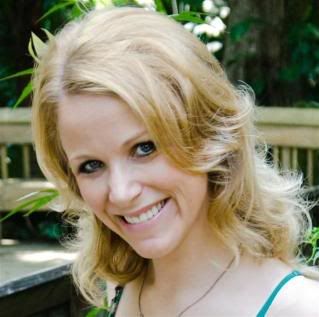Write On! is excited to interview Kristin Harmel, whose LA Book Launch/Mediabistro Cocktail Party will be on Wednesday, August 19, in Hollywood. Harmel is the author of four novels for women, including the brand new Italian for Beginners, and one novel for teens. She’s also a regular guest on the nationally syndicated morning TV show The Daily Buzz, a longtime reporter for People magazine, and an instructor for Mediabistro. Harmel discusses fiction writing, balance, and how writing a non-fiction book led her to chick-lit success.

What inspired you to first start writing?
I’ve always been passionate about writing. In fact, I’ve been writing stories for as long as I can remember. A few years ago, my mom was cleaning out the garage and came across my first attempt at a “novel,” a handwritten story—complete with illustrations and pages stapled together—about the Bobbsey Twins going to Ohio to solve the mystery of my dad’s missing tuxedo. I think I wrote it when I was 5 or 6!
How did you end up writing chick lit?
I wrote my first novel when I was 23, and chick lit was very much what I was reading at the time. But I think that as I’ve grown up in the genre, the genre itself has grown too. I’m very, very proud to write this type of fiction; I think it’s grown exponentially beyond the stigma it had a decade ago. The chick lit that is being published now is smart, funny, and heartfelt, and I think much of it speaks to the real issues women are confronting in their 20s, 30s, and 40s. I really enjoy delving deeply into issues and presenting fun, enjoyable stories with a nice, feel-good lesson.
How did you go about getting published?
I wrote my first novel, How to Sleep with a Movie Star, then I handed it over to my agent, whom I had signed with while trying to write a non-fiction book about how to survive your 20s. The non-fiction book never went anywhere, but my agent began shopping Movie Star around, and I was lucky enough that editor Amy Einhorn, who at the time was in charge of Warner Books’ new 5 Spot imprint, spotted it and decided to take a chance on me. I’ll be forever grateful to her for that.
What was your favorite thing about writing Italian for Beginners? The greatest challenge?
I really enjoyed reliving my own experiences in Rome (and Venice) while writing the novel. I also liked creating a world that opened up so many new possibilities for Cat, the main character. Perhaps the biggest challenge was trying to truly capture the magic of Rome, something that I found difficult to do with mere words. I hope that, in the end, I was able to do so!
What would you recommend for someone who wants to start writing fiction?
I would recommend reading as much as possible, across several different genres, not just the genre you intend to write in. Then, once you have an idea for a novel, I recommend reading a few of your favorite books in your intended genre, and outlining each of them to get an idea of structure and pacing. Once you’ve outlined a few books, try writing your own outline, following the same sort of pacing model. This outline will help give you a road map to writing your book.
You also teach and write articles, how do you balance everything?
Good question! I think I’m a bit of a workaholic, and my friends would probably tell you that often, I don’t do a great job of balancing everything. I work a lot of late nights and weekends. But on the flip side, I’m happiest when I’m busy.
How important is diversification for a writer?
I think that if the recent economic situation has taught writers anything, it’s that our profession isn’t always on 100 percent solid ground. I think that keeping up with a few different kinds of writing—writing novels and writing for magazines, for example—helps give you some job security. In addition, I think that when you’re doing different sorts of writing, your creativity is being fueled from numerous angles, which can only help.
Any similarities between short and long form? What are the big differences?
I don’t write a lot of short stories, but writing novels at about 90,000 words, and writing articles for People at about 500 words are as different as night and day. Plus, of course a novel is fictional, and a People-article is 100 percent factual. There’s very little overlap between the two forms, other than trying to get your point across concisely, without wasting words, while conveying the necessary emotion.
Any additional advice for writers?
My best advice for writers is probably the simplest: Just write. I think that it’s easy to continue putting off a writing project, citing a lack of time. But if you’re serious about writing a novel, figure out how to carve an hour or two out of each day that you can truly dedicate to your novel. Just an hour a day will be enough to complete a chapter a week, which means you should have a first draft done in about six months. And don’t judge yourself or second-guess yourself along the way. Just write! You can edit the heck out of your rough draft later.
What do you know now that you wish you knew when you first started writing?
That writing a novel isn’t as daunting as one would think. Just break it down into manageable chunks—say a chapter a week—and it becomes a totally attainable goal.

(Photo Credit: Mathias Mullins)
Tags: Author Q&A Chick Lit Debra Eckerling Fiction Writing Italian for Beginners Kristin Harmel MediaBistro Write On!









Comments are closed.
Soltanto uno sciocco mancherebbe la probabilita  imparare la saggezza da cosa bello una signora!
I am interested in learning Italian. Does Mediabistro offer lessons? What level does your book equate to in an undergrad track?
James
(818) 752-2462
Actually should have put in a 🙂 to indicate humor in the past message. Looks like VG chick lit.
[…] Kristin Harmel, Italian for Beginners […]